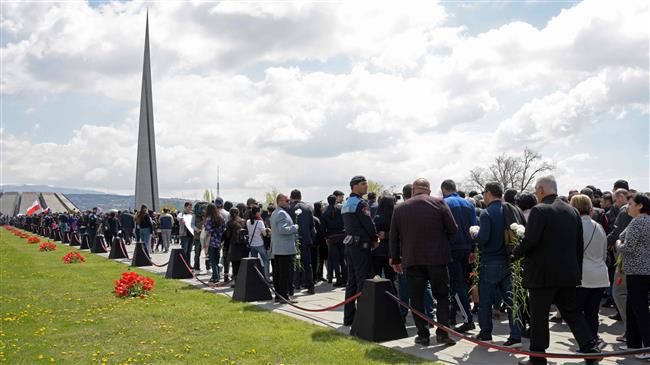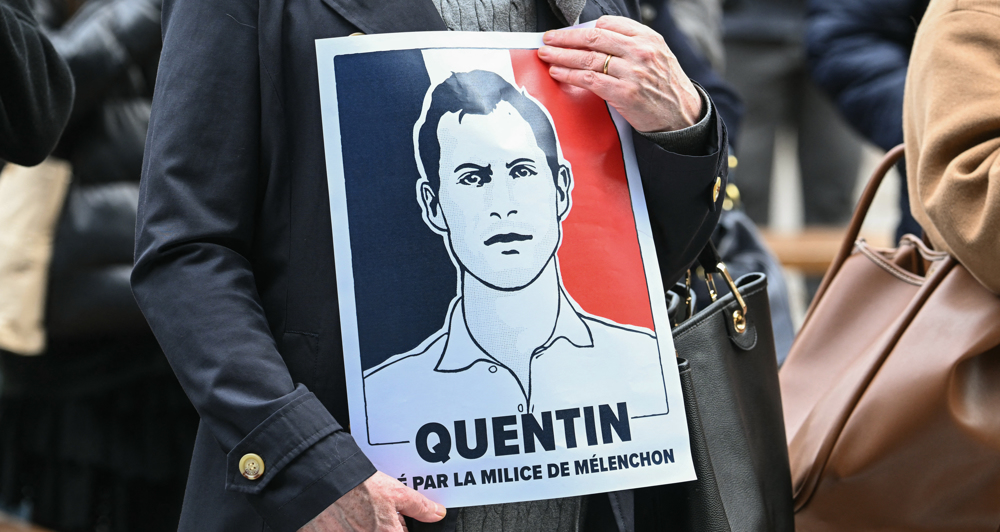US House overwhelmingly votes to recognize Armenian ‘genocide’
The US House of Representatives has overwhelmingly passed a resolution that officially recognizes the killings of Armenians by the Ottoman Empire a century ago as genocide.
The House voted 405-11 on Tuesday in favor of both recognizing and condemning the Ottoman Empire's killing of approximately 1.5 million Armenians from 1915 to 1923 as genocide.
The Turkish government has historically denied and argued accusations did not take into account the death of Turks.
“Many American politicians, diplomats and institutions have rightly recognized these atrocities as a genocide, including America's ambassador to the Ottoman Empire at the time, Henry Morgenthau, and Ronald Reagan," Eliot Engel, the Democratic chairman of the House of Representatives Foreign Affairs Committee, said on the floor ahead of the vote.
"Only by shining a light on the darkest parts of our history can we learn not to repeat them and properly acknowledging what occurred is a necessary step in achieving some measure of justice for the victims,” he added.
The House bill included three main points, declaring that the US would commemorate the Armenian genocide, reject efforts to enlist, engage or associate in the denial of the genocide and work to educate the public on details surrounding the atrocity.
The WWI-era killing has already been recognized by Russia, several European Union states and the World Council of Churches.
Huge rallies are annually held in the Armenian capital, Yerevan, with the demonstrators burning the Turkish flag in protest against the role of the Ottoman Turks in the incidents.

The occasion often sparks political tensions between Armenia and Turkey, which vehemently opposes the description of the massacre as “genocide.”
Armenia claims that up to 1.5 million of its people were killed at the time, and demands that the incident be recorded in books and documents as “genocide.”
Ankara shots back at House resolution
In reaction to the bill on Tuesday, Turkish Foreign Minister Mevlut Cavusoglu fired back at the US lawmakers' backing of the resolution and accused them of "exploiting history in politics."
Cavusoglu stated that the measure was aimed at taking revenge for Ankara’s operation against the Kurdish Syrian militants.
Ruined big game
— Mevlüt Çavuşoğlu (@MevlutCavusoglu) October 29, 2019
w/#OperationPeaceSpring. Those whose projects were frustrated turn to antiquated resolutions.Circles believing that they will take revenge this way are mistaken.This shameful decision of those exploiting history in politics is null&void for our Government&people.
The House also passed a bill later in the day to impose additional sanctions on Turkey over its military offensive against US-allied Kurdish militants in northeastern Syria.
Turkey’s “current actions against our Kurdish allies is extremely concerning and we cannot stand by and let egregious human rights violations happen,” US Congressman Gus Bilirakis said after the passage of the bills.
"Today we end a century of international silence that will not be another period of indifference or international ignorance to the lives lost to systematic murder,” he added.
On October 9, Turkish military forces and Ankara-backed militants launched a long-threatened cross-border invasion of northeastern Syria in a declared attempt to push Kurdish militants from the People's Protection Units (YPG) away from border areas.
The military operation was carried out after the US abruptly pulled out its forces of the region, clearing the path for Ankara to go ahead with a planned military action against Washington’s longtime Kurdish allies.
Feeling betrayed by the US, the Kurdish militants turned to Damascus for help, inking a Russia-brokered deal with the Syrian government, under which the Kurds allowed army troops to deploy along the Turkish border to stave off Ankara’s offensive.
Ankara views the US-backed YPG as a terrorist organization tied to the homegrown Kurdistan Workers' Party (PKK), which has been seeking an autonomous Kurdish region in Turkey since 1984.
The Syrian government has condemned the offensive as an act of aggression.
The Turkish military has previously launched two cross-border incursions in northern Syria, namely the Euphrates Shield in August 2016 and the Olive Branch in January 2018, with the declared aim of eradicating Kurdish militants and Daesh Takfiri terrorists near Turkey’s borders.
Former UK ambassador released on bail after arrest in Epstein-linked probe
Hamas condemns Israel’s arson attack on mosque in West Bank, calls for mobilization
Trump's top general warns of Iran aggression risks: reports
VIDEO | US ambassador’s remarks on Israel’s expansion spark outrage
VIDEO | ‘Protect the Right to Protest’ rally held outside London court
VIDEO | Gaza bakery supports displaced families ahead of Ramadan Iftar
France blocks US ambassador from ministerial meetings after summons no-show
Around 20 nations condemn Israeli push toward West Bank annexation











 This makes it easy to access the Press TV website
This makes it easy to access the Press TV website